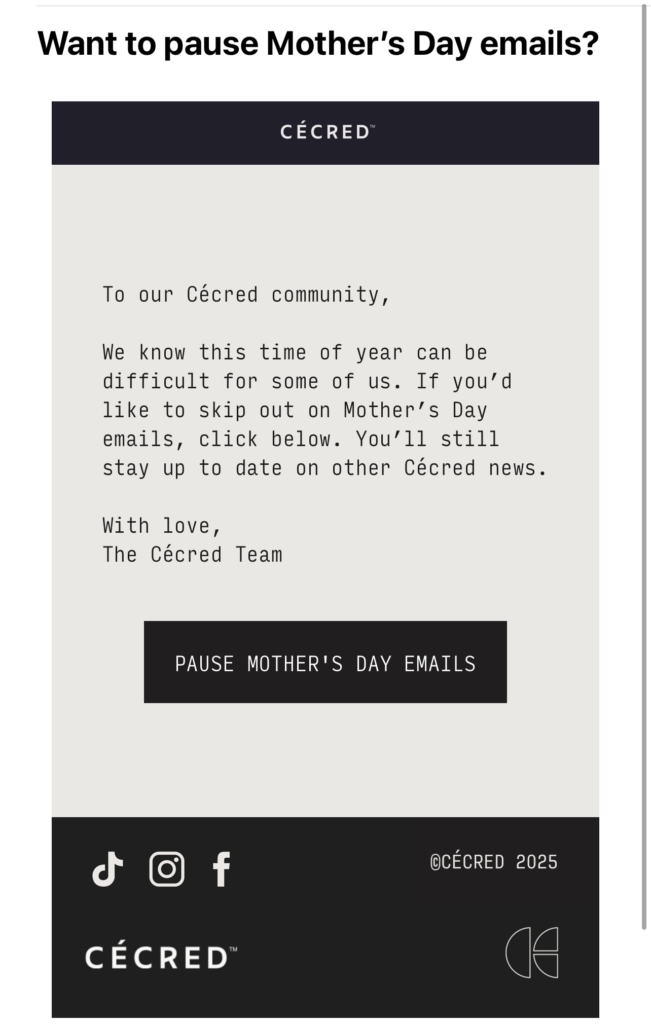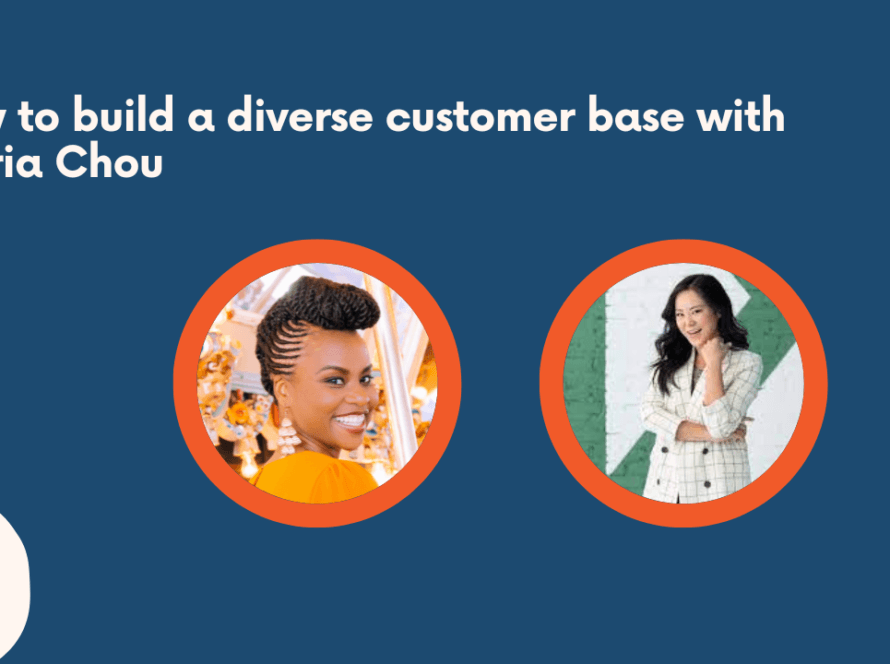For years, many brands have sent an onslought of Mother’s Day emails, working to get consumers to buy something to remember the special women in their lives.
In recent years, more brands have started to send a Mother’s Day opt-out email in advance of those campaigns.
And just in case you’re not sure what I’m talking about, here’s a quick refresher.
Listen on Apple Podcasts | Spotify
A few years ago, leading up to Mother’s Day, Peanut, a social networking app for moms, had a series of posters around London. The posters acknowledged that Mother’s Day isn’t easy for everyone.
Here are some of the different phrases featured on the posters:
- To the woman who finds Mother’s Day hard, you’re not alone.
- To the woman fighting back tears when she walks past the baby aisle, you’re not alone.
- To the woman longing to become a mother, you’re not alone.
- To the woman lost in the trenches of postpartum, you’re not alone.
- To the woman fighting a battle that no one knows about, you’re not alone.
There were a bunch of articles praising this campaign. People appreciated the acknowledgement that Mother’s Day isn’t a joyous occasion for everyone.
Other brands embraced acknowledging Mother’s Day is hard for some within their email marketing campaigns.
Some brands started sending out emails that basically said:
“hey, I know Mother’s Day is a tough time for some people. If that is you, we don’t want to cause you any harm as we send out emails related to the day. So if you’d prefer to receive any emails about Mother’s Day, you can opt-out of receiving them here. We’ll still send you other emails that are relevant to you.”

At the time, lots of people, including me, were praising this company for such a thoughtful email.
I wrote about how inclusive the brand was being. My rationale was because it was acknowledging that Mother’s Day isn’t a happy time for everyone. That includes people who:
- Lost their mother
- Don’t have a good or have a complicated relationship with their mother
- Experienced a loss as a mother
- Want to be mothers but it hasn’t worked out yet
- Struggles with motherhood
- There could be a number of other reasons not listed here
I know people who fall into these categories – I’m sure many of us do.
So getting emails about all the joy of celebrating mothers can be triggering.
One person on Reddit wrote about this topic, saying:
“Another reason I love Nespresso.”
And then the person showed the email they had received that more or less had the script I previously mentioned.
Another person responded, “It’s a kindness I didn’t know I needed.”
On another thread, one woman wrote, “Mother’s Day is the saddest day of the year for me and the less I’m reminded, the better.”
Someone else responded to that comment and said, “I HATE Mother’s Day. The dead mom club is not a fun one to be in.”
Consumer response has been overwhelmingly positive for the emails. This practice has even expanded to Father’s Day.
But – there are downsides to these emails that we need to talk about as well.
One is in the quantity of emails people get on this topic. I got two this year, but what about the person that gets 10?
One person even asked this on Reddit, writing, “is receiving a barrage of “Do you want to opt out of Mother’s Day emails not just as bad as actually receiving Mother’s Day emails? – Is anyone else finding this new practice a touch performative?”
On another thread, someone posted something similar that seemed to answer this question saying, “sometimes I feel like you get twice the emails because of that email, and then the act of clicking it seems sadder to me.”
One person wrote on that Reddit thread about the emails:
“A lot of places have started doing that over the last few years. But honestly it forces me to mentally dwell more to click through it to unsubscribe than to just mindlessley delete the Mother’s Day emails as they come. Hopefully more useful for other people.”
What may feel like a kindness might also feel like the person is getting triggered whenever they receive an email from a brand.
And even though the brands intentions are good, as marketers we have to think beyond our intentions and focus our attention on how our efforts will be received.
Another issue with regard to the emails:
Mother’s Day isn’t the only day that people don’t want to be reminded out.
For some, it is Valentine’s Day. As mentioned, for others, it’s Father’s Day. And for other it could be holidays or even religious celebrations.
I saw one person on one of those Reddit threads teasing that they were waiting on the email asking if he wanted to be opted out for Christmas.
It isn’t just that communications about different email topics and celebrations are triggering for some, but more, its about the idea that for some people, for one reason or another – they don’t want to hear about certain occasions.
It could be triggering, it could be irrelevant – let’s say you’re Muslim and don’t celebrate Christmas – you may have zero desire to get weeks of emails talking about the joy of the season.
For whatever reason, people have preferences about what they want brands to talk to them about, and what they don’t.
An alternative to sending Mother’s Day opt-out emails
So what’s a brand to do when it wants to be thoughtful and considerate of the people it serves, and doesn’t want to send any kind of communication that would be triggering for them?
Instead of asking consumers to opt-out of what they don’t want to hear, instead, have them opt-in to what they do want to hear about from you.
It’s consent-based marketing, which serves your consumers well.
And based upon what some consumers are saying – this is what they actually prefer.
One person on Reddit wrote on this topic of the Mother’s Day emails, “If they actually cared, it would be opt-in. Who likes this thinly-veiled spam anyway?”
Another commented:
“As a senior marketing manager, I feel like there is an ethical obligation to require a strict opt-in to potentially emotional content like this. I feel like the aforementioned barrage of “opt-out” emails will be as triggering as the actual mother’s day messaging.
Everyone who has a mother knows it’s Mother’s Day. Nobody needs a reminder. Not every product or service needs to have a mother’s day message crowbarred onto it. Marketing professionals: do better.
This isn’t a case of “people being offended” etc. Marketing messages are sent with the intent of maximising customer spend; so it’s not only tactless, it’s a futile endeavour – a small amount of time setting up messaging preference centres which allow subscribers to specifically opt in to the types of messages they will receive will provide a better outcome for everyone.”
And another person shared:
“No I don’t appreciate them, I really hate them and I fully unsubscribe when I get an opt out email. I just find them really presumptuous and intrusive. I would rather they send a generic opt out email at some random point in the year when you can opt out of various suggestions rather than these maudlin Mother’s Day opt outs. “
Email marketing consultant, specialist, and strategist Samar Owais agrees. Samar focuses on SaaS and eCommerce brands and has worked with companies like HubSpot, Pinterest, and other brands you’re familiar with.
Ep. 112: How to make your email marketing inclusive with Samar OwaisSamar was a guest on the podcast, and we touched a bit on this topic. Here’s what she had to say:
“so there are other ways to do it better. Right? It’s it’s a good start, but please find a way to do that better. And I find that preference centers are a great way of doing that.
Preference center emails are welcome sequences and are a great way of, like, saying, “hey. We’ve got, like, these preference centers that will personalize your email experience.
We wanna make sure we’re only sending you emails that are relevant to you.” And then just let them do their self-selection of what kind of emails they wanna receive.
And those preference center emails don’t have to only be made available during your welcome sequence or when someone first signs up to your list.
People’s circumstances and, therefore, preferences change over time.
So it is good practice to send regular reminder emails to people about what types of topics you cover, so they can opt in to the ones that are relevant to them.
You can include that in every email like some brands do – as like a footnote.
Or you can feature that option more prominently from time to time, even perhaps right before common occasions where you know people won’t always want to hear about.
That’s a prime opportunity to give people the option to revisit their preferences to make sure they are accurate.
One way you can do that is for your preference center can have a list of different occasions that people can choose to opti-in or out from, such as:
- Mother’s Day and Father’s Day
- Valentine’s Day
- Holiday’s (including Religous observances)
Doing so will reduce a lot of the friction in the customer experience you deliver to your consumers, and it will go a long way toward helping more of the people you serve feel like they belong with you.
Transcripsts
Get the episode transcript here



